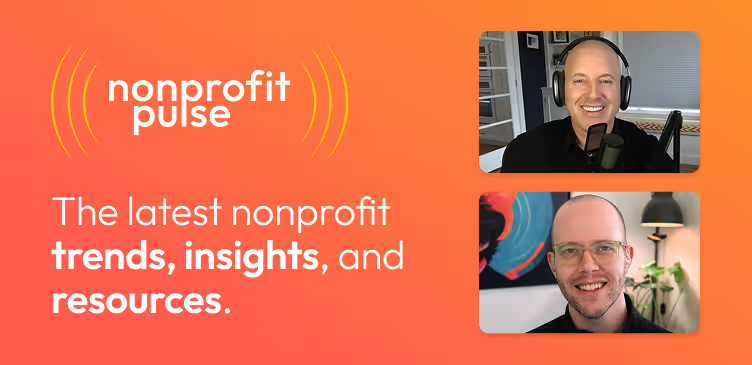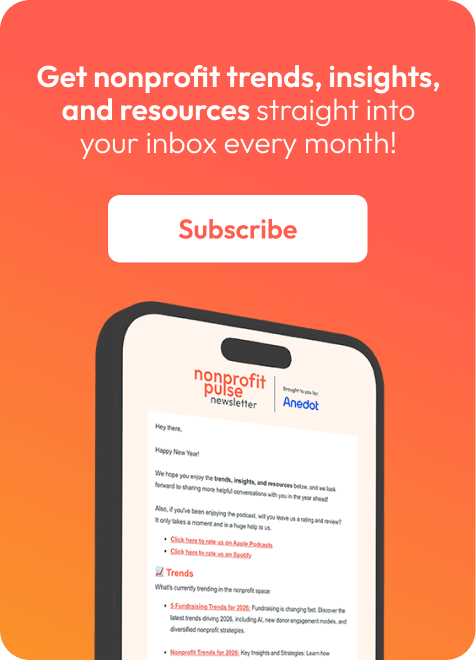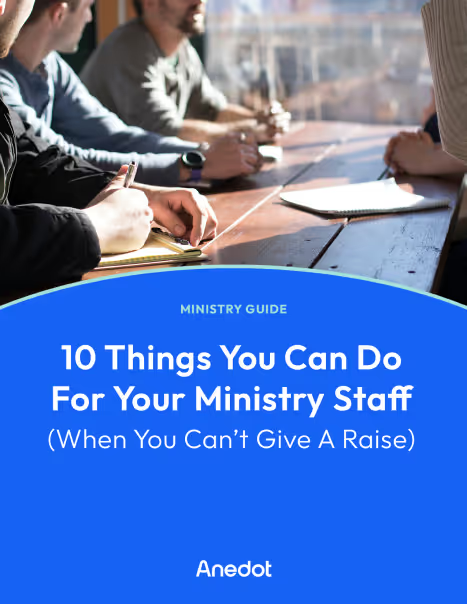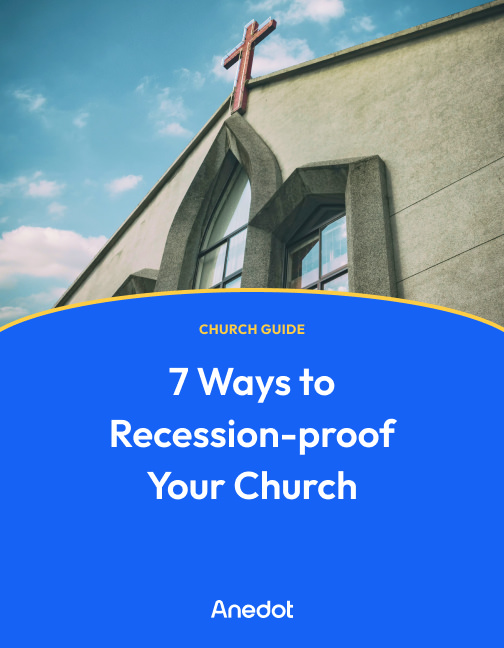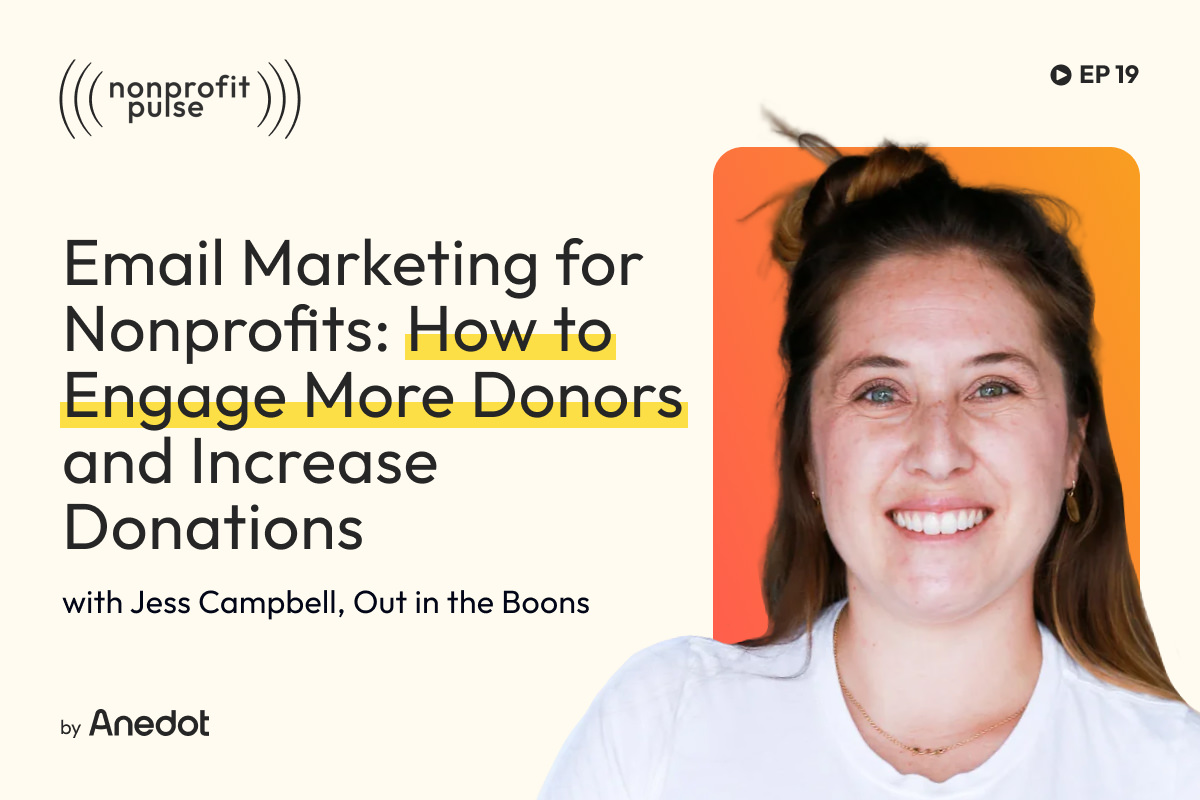Anedot Learn session transcript ↓
Patrick:
Hey, this is Patrick with Anedot. Welcome to Anedot Learn, where we help you grow your organization through giving.
Today we're joined by Tracy Dietz, who is the CEO at the fundraising agency DonorBureau.
She'll be talking to us about how she utilizes texting to grow online giving for their clients.
How are you doing today, Tracy?
Tracy:
I'm good. How are you? Thanks so much for having me. This is awesome.
Patrick:
I'm good. Yeah, text messaging is a topic that comes up a lot with customers that we work with, and we know that you're an expert in this area, so we wanted to get some insight from you on text messaging.
So if you just want to start just telling us a little bit about yourself, DonorBureau, and what your day-to-day looks like and who you work with.
Tracy:
Yeah, so DonorBureau at its core is an analytics company.
2020 certainly changed that a little bit, which is when we sort of got into the text messaging agency side of work and actually doing fundraisings for organizations and candidates.
But we were founded by Matt Hafer and Brian Johnson in 2011 and the core of their business, if you think about credit bureaus and what they do with Fair, Isaac and basically scoring people to tell you who's most likely to be a good creditor and who you should loan money to, DonorBureau does the same thing.
We can tell you who is most likely to give to any particular cause or campaign that you're putting together.
In 2020, most of what we were doing at the time was working with direct marketing agencies on the direct mail side.
We had done a little bit of stuff in digital on the email side and we had just started to get a little bit into texting, but I mean, COVID shut down everything and so we pivoted and we got into raising money for both nonprofits and campaigns as well.
Overview of text message marketing

Patrick:
What would you say is your breakdown now between some of the traditional stuff y'all used to do versus email versus text? Is it an even split or does it just depend?
Tracy:
I think we are definitely doing more and more texting as we grow.
Everybody needs money and so when your product is raising money and putting money in your bank account, that sort of monopolizes everything else.
The analytics side we still use in all of the businesses, so we're still using analytics and direct mail. We use our own analytics for our own products and texting and email as well.
But it's a big portion. Because it's so easy, it's not easy to do, but it's very easy to test and figure out if something is working quickly and raise a lot of money fast if that's your goal.
Patrick:
When you test, I mean, what is the usual response rate here? Because some of the things I hear from people who are hesitant to texting is like, "Oh, it just annoys people," and I'm like, "No, I promise this works."
So what do you typically see in terms of response rate and how do you know you're on the right track for a client?
Tracy:
It totally depends on the list, the client, is it a prospecting send, is it a house send? Ranges.
I mean, it can literally be as bad as 0.1% to 1% depending on what it is.
I mean, the environment, where we are in the year, what's going on in the news really impacts everything.
We have found that anger and panic drive a huge percentage of donations in both the campaign world and in nonprofits, so prospecting, like I said, can be from 0.1 to 0.3, and then your house stuff could be at 1%, which sounds terrible, right?
Patrick:
It sounds bad, but you are selling to a lot of people.
Tracy:
Right, right, right. That's where a good partner comes in that has affordable pricing for you and is flexible and will work with you on things.
Because you can test such a small segment quickly, you don't have to spend a ton of money to do a quick test.
If you do a test of, I don't know, three to 5,000 people and find out that it's not very good, you can pull it, pivot, and circle back and try something else.
Patrick:
Yeah, we spoke a little bit about before this how you primarily work with larger organizations and that tends to be your sweet spot.
Let's say there is a smaller organization that's just trying to either do something on their own or do something local.
Just organizations in general, what kind of organizations do you see that are successful, or what lends them to be successful, and which ones do you think you're like, "I don't know this necessarily it's for you"?
What would you say, not necessarily just for who you work with, but just in general, if they're looking on taking on texting.
Tracy:
Yeah, so obviously organizations with huge brands are going to do very well in text.
Smaller organizations that nobody's ever heard of is going to be harder.
However, we have had a lot of success with military organizations and police organizations, so if you are one of those smaller organizations, you can certainly go into text field and make that work for sure.
Patrick:
I guess it's kind of like the mediums have changed, but it doesn't change the fact that intensity has a lot to do with it, people feeling that intensity to want to take action.
Tracy:
Yeah, and we did something with a cancer-related group a while back, and one of the things we found, which was one of the great things that Anedot offers is we put that organization on the backend for upsells for another client that was military-based, and we were able to raise more money for the client through upsells than we were actually just sending text messages directly on the topic.
Patrick:
I think that's a good point and something we've talked about in the past is teamwork and partnership.
That a lot of times sometimes the best way to find people is knowing someone that has already given to a like-minded organization, or you know they care about that cause, so that's another good point that organizations of any size could find another organization that is of a similar size and maybe has a similar supporter base.
Tracy:
Right, for sure.
Text message marketing best practices

Test your text message content
Patrick:
When you're sending texts, what usually do you include in the text?
What are the main points? Do you do photos, video? What does the content usually look like?
Tracy:
Totally changes by clients, by the time of day, by the environment, by what's on the news cycle.
We have found that videos and pictures and MMS as opposed to an SMS, which basically that just means there's multimedia in the text message, so there's a picture that comes across with the text message and then the link to donate actually has a better response rate and is much less likely to get blocked by the carriers than SMS.
So we have done a ton of testing around MMS versus SMS, and we think that with the 10DLC registration, SMS is going to get better, but MMS is still king when it comes to making sure stuff actually gets to people's phones.
Patrick:
Yeah, and the 10DLC thing is really interesting because we've actually looking at internally now, too, whereas you said a lot of this is based on the carriers.
For people familiar with email, like email deliverability, it can be a moving target. To your point, with 10DLC, you're talking about the long-form numbers that you get approved and go through the process versus the shortcodes which we had before.
Watch out for legal changes
Patrick:
Do you have any regulatory concerns or is there anything, any changes that you're watching out for that that could be problematic for people?
Tracy:
Yeah, the laws are changing every day in every state and everybody has something different.
One of the things, we have done a bit of merchandise incentives with some of our clients. Some of that has been really amazing and some of it has been absolutely terrible.
Again, environment, the time of year, the message, all of that matters a lot. But we had one client that basically offered up a piece of merchandise for any donation amount. They would send you that for any donation amount.
But in some states, that is now considered an actual commercial text and it's not considered nonprofit and it's actually selling a product instead of asking for a donation.
So in states like Florida specifically, be very careful because a lot of the stuff is changing down there.
Patrick:
Yeah, and that's something we're kind of watching out for, too, because we've been doing more with merchandise as well and having the market value and trying to do everything we can, making it clear that, "Look, you're still giving a donation," but that's a good point.
For folks in Florida that are looking to do this, that's something to watch out for.
Tracy:
Yeah, I mean, if you're going to be doing texting, you absolutely should have a TCPA lawyer that you are working with in some capacity to walk you through and help you with some of the regulations
Patrick:
Or obviously, working with a company like yourself who has the expertise as well is probably one of the reasons you would want to do that.
Tracy:
Right, right, right, or us. Yes, sure.
But if you're a smaller organization and you want to get into texting by yourself without the help of professionals, there are groups that do it, just make sure you're covered.
Many nonprofits have lawyers on staff, but everyone doesn't have someone that is well versed in the laws of TCPA and on top of what's going on in every state.
Include surveys in your text message marketing
Patrick:
Other than merchandise, are there any other incentives that you've tried that work well or that you can think of?
Tracy:
You can always do a survey. I mean, we've always found that survey content does very well because we found that the donors then feel invested and seen that we're asking them for their opinion.
They're taking a survey, they're giving you information, they're giving you feedback, they're telling you why they care about your organization, or whatever the topic is that you're asking them about.
So we have definitely seen response rates on those go up, so highly recommend that to anybody that might be trying out texting.
Do a survey. Longer surveys are actually really good. I mean, when I say "long," I mean 30 questions on a landing page are great, which is weird 'cause I'm like, "Who is gonna sit through that?"
But when we've done tests, we've done two questions and we've done 30 and 30 will win. It's crazy.
Patrick:
That's really interesting. It's not something I think anyone would've guessed, but I guess it does show that if somebody is that committed and that motivated that they're more likely to follow through.
Tracy:
Right, and if they spent that much time, five, ten minutes filling out a survey, they're invested, so now they want to give their $5 or $10 or whatever it is you've asked for.
Patrick:
Yeah, that's really useful knowledge 'cause I think most people would think the opposite.
It's kind of like we always think about, too, always be testing, right?
Tracy:
Right.
Patrick:
Because you never knew, sometimes the counterintuitive things are actually the best-performing ones when you actually go and test it.
Tracy:
Right, you can always figure out the answer pretty quickly. I mean, again, that is the other awesome thing about text is you don't have to wait for the mail to come back.
You don't have to wait for the CAGRs. I mean, you really know within five to 10 minutes if a message is resonating and working or not.
Do not send texts multiple times a day with the same messaging
Patrick:
When you're sending out messages, I know one question that some folks might have is, "How much is too much?
How much should I be sending? What's a regular cadence?"
Do you have any insight into if there's a specific breaking point or just any sort of insight into what might be too much for someone?
Tracy:
Yeah, I wouldn't text people 20 times a day.
Again, it depends on the message, the client, and the time of year.
If you are working for a political campaign and it's election day and it's a get-out-the-vote text, not a fundraising text, you might send seven or eight times in a day.
Our normal process is we usually do once a week for prospecting on a particular client. I think that's a good amount. There will certainly be people that would fight me on that and say, "We text every day, sometimes three times a day." We don't.
I mean, nonprofits are certainly very different than political campaigns, so I don't think it's great to bombard people.
The most important thing is the relationship that you have with your donor, so if you are sending them a thank you letter for donations, that's a different than just asking them for money every day, so the cadence really just depends on what the message is, and what you're trying to achieve.
But I definitely would not text people multiple times a day with the same type of messaging.
Patrick:
Yeah, 'cause at some point you're just churning your list and that kind of defeats the purpose because they might be willing to give if you balance it out.
How to get started with text message marketing

Find a text message marketing provider that is up-to-date on rules and regulations
Patrick:
Obviously, you probably have standard platforms for everything you use 'cause of the volume you do.
Let's say it is a small organization that's saying, "Maybe I'm going to take this on myself," and they're looking at just the text platforms, the actual ones sending the texts.
Is there any insider or advice you give there on what to look for?
Because I'm sure there's a million providers out there, so is there anything they should be watching for when they're trying to decide maybe between a couple?
Tracy:
Yeah, obviously, you want a good partner that is up-to-date on all the rules and regulations and laws.
You want somebody that knows you can't text people before 8:00 AM in any given time zone and that has a system that can actually roll based on that.
We sometimes will do sends at 10:00 AM East Coast time, that's 7:00 AM in California, so you don't want those California numbers to go out until it's legal to actually send them out.
Most of our partners have it set up so that you can't text into a time zone if it's legally not allowed.
Make sure your partner has a TCPA lawyer really, really close to them and then find somebody that's going to give you the right cost because texting is getting far more competitive.
You also want to make sure that the group that you're working with does peer-to-peer texting and not just automated because automated, you have to actually be opted in to your list and peer-to-peer you don't have to be opted in and so the rules are different for that.
Most everything we do is peer-to-peer just to be safe. We have more cover that way, so you want to make sure that somebody is doing all of that and not auto-dialing or randomly generating numbers or any of the things that are huge flags.
Patrick:
I often find, too, when something seems too good to be true, it often is, so it's probably good to get a couple of ideas that way 'cause as you said, there's a lot of fly by and people doing things, so you want to make sure that you're covering yourself legally 'cause this is an area that has a lot of legal ramifications.
Define your text fundraising goals
Patrick:
Let's say with you, let's say we have a large brand or somebody who's like, "Look, I really like what Tracy's saying. I think we need to adapt. We have a direct mail fundraising program, but we don't necessarily have a texting program."
What do you usually ask or what is the starting point if you're like, "I want to start working with this client"? What are the expectations back and forth?
Tracy:
Yeah. Are you going to be pleasant and nice to work with? No, I'm kidding.
I mean, that does make a difference with all of the stuff that goes on with texting. I mean, we certainly like to work with nice, kind people.
But biggest questions, what are your goals? What are you trying to achieve?
Are you trying to just get more donors? Are you trying to get more money in the door? Are you trying to get more names to cultivate for some other project you're doing?
How do you manage success? What are your metrics for defining what is good?
I mean, DonorBureau does, like I said, mostly everything through RevShare, so we don't charge a retainer, we don't charge fees for doing creative, we just take a percentage of the money that we raise and the particular organization for something like that has to have a solid brand and they have to be pleasant to work with because we are certainly out of pocket the gate and the client never is.
That's great for them, we could raise them money all day, but if their definition of success is, "I wanted 7,000 new donors, I didn't want the $100,000," then you just have to figure out what that balance is and what it is that their actual goal is.
Patrick:
Got it.
Tracy:
Because there's clients that we can raise a bunch of money for and there's clients that will raise a thousand dollars for because they're smaller and no one's ever heard of them, which we love nonprofits like that.
Bless you, thank you for the work that you do. But it's harder for us. We can't just work for free.
Patrick:
That's kind of a differentiation, too, between probably what you do and maybe what some other organizations where you're really focused on prospecting, getting new donors in the door.
Tracy:
Right.
Patrick:
That does require people, you're reaching people who've never heard of them, so they have to at least have some kind of brands, they're aware of it, whereas other organizations, someone else is listening, you may not be doing that prospect and you might be doing saying, "Oh, well, we're going to use the numbers we already have for people who have given."
That's a little bit of a different dynamic, so it just kind of depends, like you said, on who it is and who they're targeting and whatnot.
Find an agency that can handle prospecting
Patrick:
If it was someone, though, let's say it was someone who they say, "Tracy, what you do is awesome, but we are smaller and we're looking at our house file and just doing it on our own," if somebody was trying to say, "Okay, I want to accentuate my direct mail with some texting," what advice, first steps?
What would first steps you think would look like for them to do that?
Tracy:
Yeah, so it's interesting, if they have a direct mail list, many people think, "Oh, I'll just take my direct mail list and I'll pin cell phone numbers to it and I'll text it and it'll be great."
We have found that cross-channel is not great. Texting is great to increase the response of direct mail, so you can mail people, do a text to the people that you mailed after the fact and say, "Hey, did you get this mail piece?" and it will increase your response rates on mail.
Taking a direct mail list or pinning cell phone numbers and just blast texting a prospecting piece has been very ineffective, so I would caution people to not do that because that's going to be the first thing that they're going to do.
I would actually just recommend going and trying to find an agency that's willing to do prospecting that will take them on as a client to help them build a handful of donors before they go start doing it themselves.
There's a group of organizations and agencies out there that actually do what we do that can help with stuff like that, and some of them may charge a small retainer, but it probably makes up for it on the fundraising side.
Patrick:
If they wanted to find those, how do your clients typically find you?
I mean, if somebody says, "Okay, I understand I need a professional," what do you think are usually the best ways to find someone like that?
Tracy:
I mean, they probably call you, right?
Patrick:
Yeah, we do get some. Yeah, we get some.
Tracy:
I mean, most organizations that are doing fundraising are at a lot of the nonprofit organization conferences.
Patrick:
We find that, too, that at these conferences, there's always someone who wants to work with you. It may not be the first company, but there's probably one or two that do, so like you said, networking is really important at the conferences, which I know you all do really well.
Tracy:
Yeah, we go to a lot of conferences.
Closing thoughts on text message marketing

Patrick:
If there's any takeaways from someone who says, "Okay, I'm going to get started texting," if there's just three things that people could remember or three things that they should just watch out for, what would those be that you would throw out there?
Tracy:
Know the laws and regulations, test, test, test, and find a good deployment partner.
I mean, that really is making sure you have somebody that is sending the text messages for you that knows all the laws and is abiding by them is critical.
There's a number of firms out there that do it and I'm happy to give recommendations if anybody wants to call me and ask me.
Patrick:
Well, if anyone it does want to connect and they have questions after this to connect with Tracy, we can definitely do that, whether you work with DonorBureau or with someone else because we send texts and network very well.
We appreciate you hopped on with us, Tracy. I don't know if you have any final words or anything else you want to mention before we go?
Tracy:
No, this was great. Thank you so much for having me. I appreciate it.
I'm sorry I'm a little hoarse. My kids had a dance competition this last weekend and a lot of screaming.
Patrick:
Yeah, it's funny. It's something when I'm always talking to customers and things like that. At the end of the day, we're all human, right?
Tracy:
Right.
Patrick:
We're all learning and experiencing life. I'm a tomato 'cause I recently went to a baseball game, so it's kind of funny.
Tracy:
That's awesome. Congrats.
Patrick:
But anyway, yeah, this was Tracy Dietz, CEO with DonorBureau talking to us about text message marketing.
Keep an eye out for our future videos where our CEO Paul talks about upcoming product releases and then we have other customers and folks we work with to talk about what they're experts in and hopefully pass along some of that knowledge.
Thank you, Tracy.
Tracy:
Thank you.
Patrick:
We will see everyone on the next one.
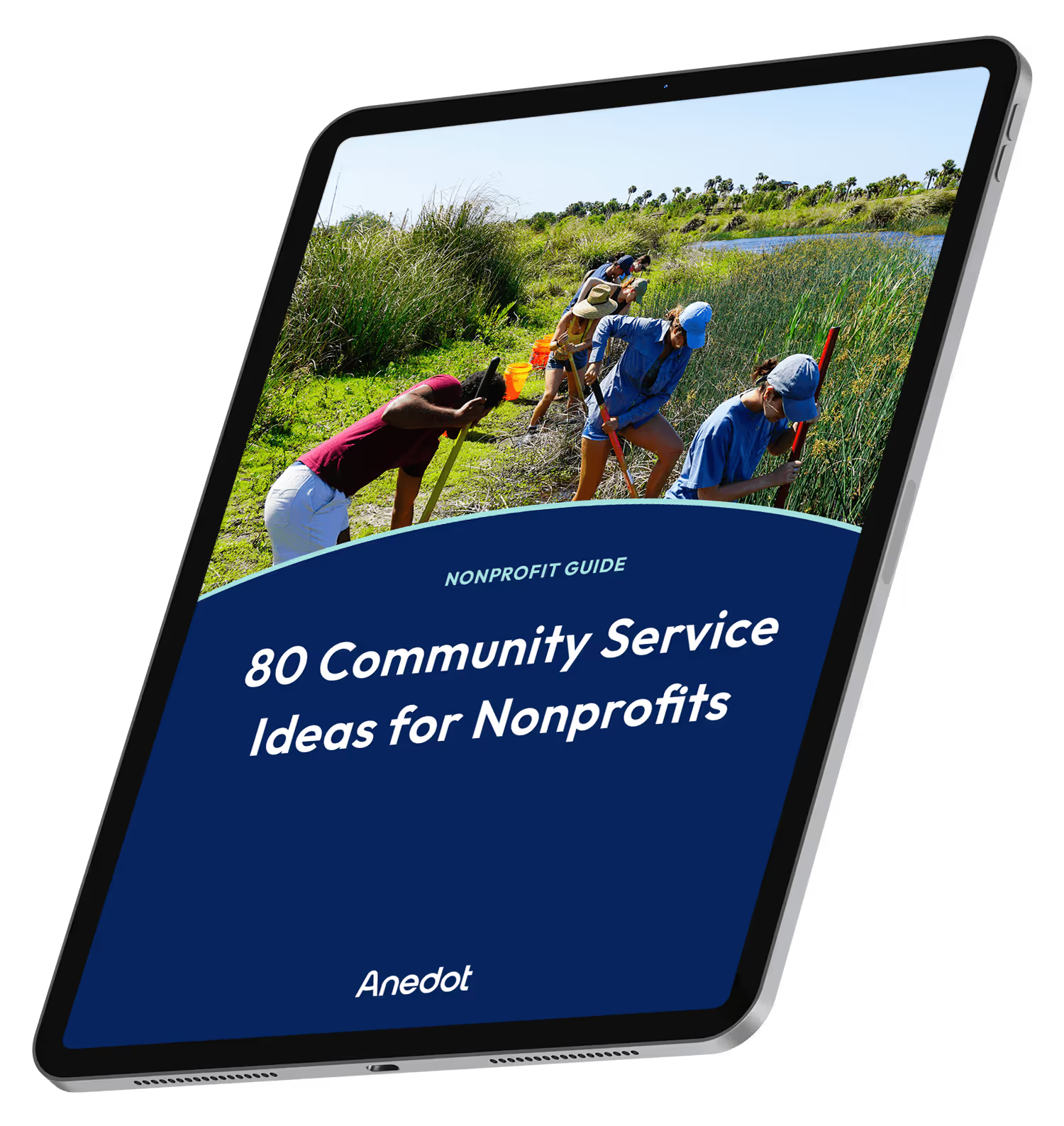
80 Community Service Ideas for Nonprofits

